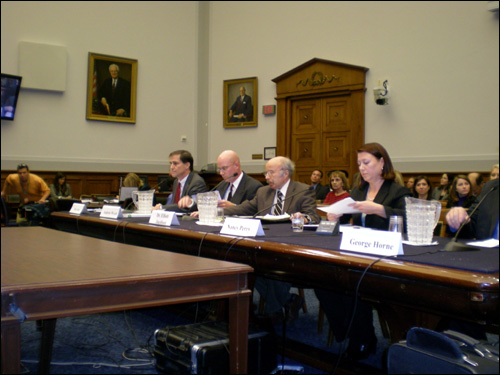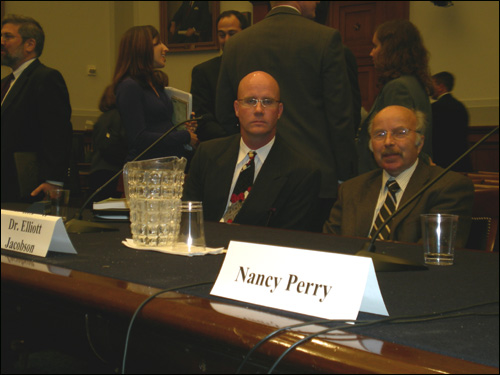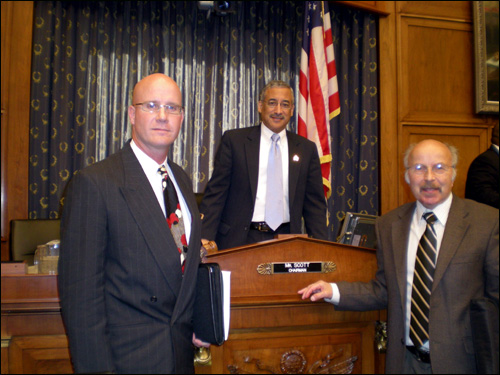Posted by:
USARK
at Mon Nov 9 11:05:03 2009 [ Email Message ] [ Show All Posts by USARK ]
On Friday, November the 6th at 10:00 am the USARK delegation consisting of Andrew Wyatt, Dr. Elliott Jacobson, Michael Cole, Frank Vitello and Todd Willens attended the U.S. House Judiciary Committee, Sub Committee for Crime, Terrorism and Homeland Security Hearing on HR 2811 aka ‘The Python Ban’. Chairman of the Committee was Congressman Bobby Scott (D-VA). The ranking member was Congressman Louie Gohmert (R-TX). Co-sponsor of the bill, Congressman Tom Rooney (R-FL) was also in attendance. The expert witnesses giving testimony in support of HR 2811 were the bills' sponsor, Kendrick Meek (D-FL), Dan Ash, U.S. Fish & Wildlife Service (USFWS), Nancy Perry, Humane Society of the United States (HSUS), and George Horne, South Florida Water Management District (SFWMD). Testifying in opposition to HR 2811 was Andrew Wyatt, President USARK and Dr. Elliott Jacobson, Professor of Zoological Medicine, University of Florida.

Panel of expert witnesses from left, Dan Ashe USFWS, Andrew Wyatt USARK, Elliott Jacobson U of FL, Nancy Perry HSUS, George Horne SFWMD
Testimony went very much as expected, with HSUS and SFWMD calling for an end to the reptile industry, suggesting that all nine snakes addressed in the recent U.S Geologic Survey (USGS) report be added by amendment to HR 2811. That would include all four anaconda species, the two African pythons, Burmese python, reticulated python and Boa Constrictor. The surprising testimony was given by USFWS when they also called for the addition of all nine snakes to the bill citing their lack of expertise and ability to complete the evaluation of Boa, Python and Eunectes already underway and due to be completed by 2010.
Andrew Wyatt testified to the negative economic impact and loss of jobs that would occur if HR 2811 were to pass illustrating that the trade in reptiles is about 3 billion dollars annually and would effect on over 5 million Americans and thousands of small businesses. He also pointed out the fact that this bill is not only about import, but the approximately 4 million animals in captivity in the United States. HR 2811 makes absolutely no provisions for what would happen to the millions of animals already in captivity. Additionally he commented that this issue has been over sensationalized and politicized sacrificing good policy and science for political expediency. The premise for making drastic changes to HR 2811 was predicated on the recent USGS report which failed to make the case that proponents had hoped for.
Dr. Elliott Jacobson testified that the USGS report was riddled with uncertainty and referred to it as a “gray paper”. Dr. Jacobson noted that the paper was filled with errors, inaccuracies and over simplifications and had not gone through the rigorous peer review process necessary to be published in a scientific journal, but rather an internal review within USGS, thus placing it in the realm of “gray literature”.

Andrew Wyatt & Dr. Jacobson Testify on behalf of the Reptile Nation
Although some members of the committee were overly aggressive in their questioning of Andrew Wyatt, Chairman Scott, Ranking member Gohmert and Representatives Rooney and Goodlatte were earnest and inquisitive in their questions and attempt to see all sides. USARK was able to make a strong case for the Reptile Nation. No decisions have been made as to how HR 2811 will move forward. USARK continues to have close contact with key members and committee staff in order to insure the best interest of the reptile community.

Andrew Wyatt & Dr. Jacobson w/ Subcommittee Chairman Bobby Scott
***All in all it was a very tough hearing, but this is not over by a long shot. This is the time for the Reptile Nation to come together as never before. We still have the ability to have real influence on the outcome. Join USARK! There is Strength in Numbers... Protect Your Rights. The Reptile Nation needs you now as never before. DO NOT GIVE UP!!! The Reptile Nation will prevail.
Click here to read individual testimony. Then click the name of the witness.
judiciary.house.gov/hearings/hear_091105_1.html
Click here to see the Webcast. It is in two pieces.
jetpythons.com/HR2811Nov6.wmv
jetpythons.com/HR2811Nov62.wmv
USARK Testimony on HR2811 before House Judiciary Committee, Subcommittee for Crime, Terrorism & Homeland Security
Mr. Chairman, members of the Subcommittee, I want to thank you for the opportunity to be before you and present testimony today on HR. 2811, a bill to amend title 18 of the U.S. Code, to include constrictor snakes of the species Python genera as an injurious animal.
My name is Andrew Wyatt and I am here representing the United States Association of Reptile Keepers (USARK), of which I serve as President.
By way of background, USARK represents the highly sophisticated commercial production of captive bred reptiles in the United States. We are a science and education based advocacy for the responsible private ownership of, and trade in reptiles. USARK endorses caging standards, sound husbandry, escape prevention protocols, and an integrated approach to vital conservation issues. Our goal is to facilitate cooperation between government agencies, the scientific community, and the private sector in order to produce policy proposals that will effectively address important husbandry and conservation issues. The health of these animals, public safety, and maintaining ecological integrity are our primary concerns.
Over the past 60 years, the practice of keeping reptiles has changed from an obscure hobby to an incredibly widespread and mainstream part of the American experience. Reptiles have become intensely popular and are now present in millions of American households (1 in every 25 US Households has 1 or more reptiles). They now permeate pop culture, movies and advertising. Who doesn’t know the Geico Gecko?
From early beginnings in the pet trade herpetoculture, the practice of breeding reptiles and amphibians, has grown into a sophisticated and independent $3 billion annual industry. Herpetoculturists produce high quality captive bred animals for collectors, research, zoos, museums, TV & film. For reference, these animals can be valued at over $100,000 for individual specimens. Millions of dollars flow into the national economy from the Reptile Industry. It is interlaced and interconnected with all levels of economies. Purchases of equipment, dry goods, bedding and cages channel money into U.S. manufacturing. Millions of dollars go to support American agriculture with purchases of food, including rodents, grain, bedding, vegetables and prepared diets. Millions of dollars more support airlines and parcel shippers. The Reptile Industry in the United States accounts for 82% of the worldwide export and trade in high quality captive bred reptiles. Thousands of American small businesses and their employees depend on the Reptile Industry.
Reptiles are an animal interest that have captivated an incredibly diverse cross section of the American demographics; from scientists to school children, Wall Street bankers to construction workers, conservationists, attorneys, teachers, rock stars, actors and even politicians. Your friends and neighbors keep reptiles. Some member of your family keeps, or has kept, reptiles. Collectively we refer to this demographic as the Reptile Nation, comprising more than 5 million Americans. All are intensely interested in protecting their legal rights to possess and work with reptiles. Reptile keepers are single-issue voters when that issue is perceived as unnecessary, unwarranted, or unfair regulation of their legal right to own and care for their animals. An example of this passion and organization was witnessed earlier this year when Members of the House Committee on Natural Resources received nearly 50,000 letters from the Reptile Nation in advance of a legislative hearing on a well-intentioned but misguided and fatally flawed legislative proposal.
USARK is concerned about feral Burmese Pythons in the Everglades and the impact they could potentially have on the eco-system of South Florida. We recognize the problem and have committed to be part of the solution. Our members have been intrinsic in the creation of a Python Removal Program in coordination with Florida Fish & Wildlife Conservation Commission (FWC) and we were the first to be licensed to remove pythons from state lands in South Florida. USARK has actively appealed to the U.S. Department of the Interior to open up Everglades National Park to a removal program modeled on the Florida program. We do not believe captured pythons should be re-released back into the Park for any reason. USARK has offered $10,000 to United States Fish & Wildlife Service to establish the basis of a program to get pythons out of Florida and into qualified hands that can securely and humanely house them for the rest of their natural lives. USARK has great expertise in regards to pythons; how to find them, where to find them, reproductive behaviors, predation, safe secure maintenance in captivity… etc. Unfortunately, in our view, the federal government has failed to capitalize on this vast pool of knowledge and experience to most effectively address the issue of feral Burmese Pythons in the Everglades National Park and South Florida.
Beyond the invasiveness of the Burmese Python, it is our fear that the issue is becoming overly politicized and media-driven, thus creating a situation where we've selectively interpreted the available science. This is an issue area, especially in this Committee, that isn't especially well-known, and thus it lends itself to misinformation and over-generalizations. The physical danger posed by pythons toward humans has simply been grossly overstated. Even in their native range of South East Asia, where human population densities far exceed that of South Florida, deaths attributed to pythons are extremely rare. As a general matter, pythons have never posed a real threat to humans. That's not to say however, they make the best family pet in every case, or that they cannot pose a threat when best handling practices are not followed or existing laws designed to ensure responsible ownership are ignored. Only that they are not the dangerous killers portrayed by activists in the media.
USARK estimates that today there are over 4 million Boas and Pythons in captivity in the United States. This represents about $1.6 billion in asset value and $1.8 billion in annual revenues. Of these in captivity today, 100,000 are Burmese Pythons or African Pythons. {None of these animals will be going anywhere, because there are no provisions in HR 2811 for the disposition of these animals.} USARK will continue to work on shifting the ongoing debate over these species toward policy resolutions based upon complete and solid science. The utmost of care should be taken in any attempt to mange the captive and feral populations. If mistakes are made, problems will only be compounded. Simply legislating animals onto the Injurious Wildlife List of the Lacey Act will not accomplish HR 2811’s stated intent. Rather, it will destroy the most valuable resource capable of effectively managing the millions of animals already here. If you reduce the value of these animals to zero and destroy the livelihoods of those most qualified to deal with the secure disposition of all of these animals, where will that leave us?
USARK has been developing and employing best handling practices and accreditation for many years and welcomes a more in-depth discussion in this regard with congressional and administration officials. It is our belief that best management practices and professional standards specific to certain reptiles is what is needed, not draconian measures that will only succeed in destroying a viable industry.
Not only is the reptile industry a viable component of the American economy, but we have made an unparalleled contribution to conservation; captive breeding as a conservation safety net. Captivity is now considered an important tool of vertebrate conservation. What is today being attempted around the world for amphibians through the International Amphibian Ark, and as proposed by the Great Cats and Rare Canids Act (H.R. 411 and S. 529), and many captivity programs for other rare vertebrates ranging from Sumatran rhinos to Guam kingfishers, has already been accomplished for reptiles. Today the vast majority of boas and pythons held in captivity are captive-bred animals. These are animals that have not been removed from the wild. Reptiles are today more securely established in captivity than any other vertebrate group. This is truly one of the greatest conservation accomplishments of the past 20 years.
Almost all species and subspecies of boas and pythons have been bred in the United States. There are now viable self-sustaining captive populations of several hundred species of reptiles being maintained in the United States. Most pythons and many boa species now exist in captivity as viable ancillary populations. This has been accomplished through a decentralized, non-governmental, economically driven model of conservation. It is American private enterprise that has achieved this very impressive modern goal, not a penny of American taxpayer dollars has been spent in this endeavor.
As the Subcommittee is aware, there is a scientific process underway at the US Fish & Wildlife Service which carefully evaluates the science prior to making an “injurious species” determination. I would note that one of the commitments of the current Administration was not to politicize the scientific process used to make some of these policy decisions. I ask that this Committee do the same. USARK is fully aware of the criticism that the Fish and Wildlife Service injurious species process takes too long and thus members of Congress are now being pushed into overriding this scientific process for the sake of political expediency. This is wrong. This was wrong when it was attempted before for other species, and it is wrong today. Ironically though, many of the groups backing HR 2811 have had decided to suspend their policy in order to fit their agendas on this issue. It is important to note that, historically, these same groups feverously have opposed other legislative and regulatory efforts that favored political policy over scientific fact.
I ask that the Subcommittee note and consider state-level legislation that is now in place in all but eight U.S. States. For example, last year legislation was passed in NC with the support of the NC Partners in Amphibian & Reptile Conservation to regulate the ownership and use of large constricting snakes. Similar legislation exists in the states of Texas and Florida, for reference. These measures insure that safe, secure, professional best management practices are observed to legally work with these animals. USARK is also currently working in VA and SC to introduce similar legislation in 2010. These best management practices embodied in existing state legislation could easily be adapted to a national USARK accreditation process insuring uniformity and professionalism across the country.
In conclusion, many of these species we are discussing today have been captive bred in this country for over thirty years and have demonstrated no evidence of invasiveness. It is our hope that this Subcommittee will choose to take a more measured approach than is set forth in HR 2811. USARK is committed to safe reptile ownership and welcomes the opportunity to work with Congress to that end.
Again thank you for the opportunity to appear before the Subcommittee. I am happy to answer any questions you may have.
-----
Andrew Wyatt
President USARK

[ Show Entire Thread ]
|





